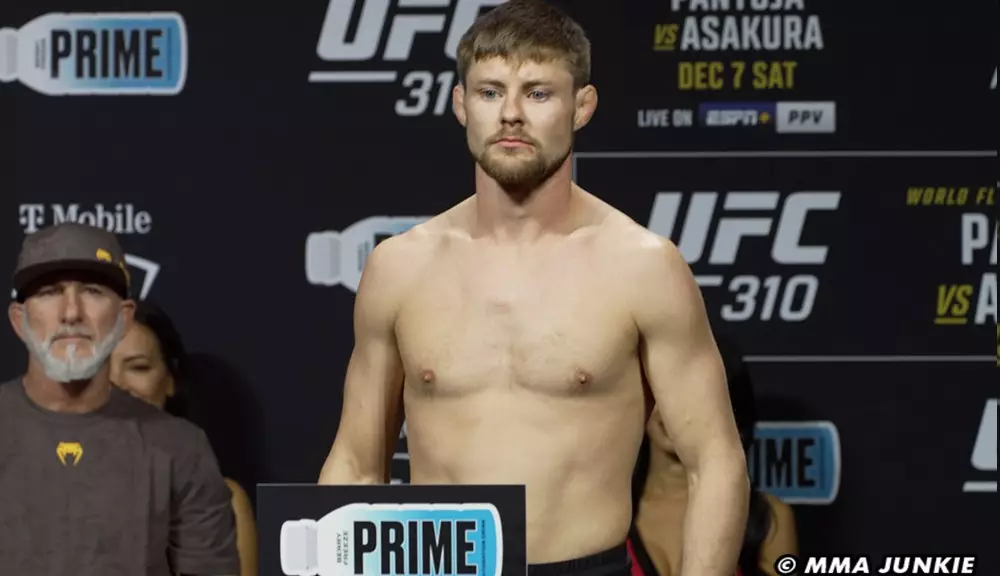In the realm of mixed martial arts, fighters are often revered not only for their physical prowess but also for their ability to influence public perceptions and cultural narratives. The recent comments made by UFC featherweight Bryce Mitchell have sparked a maelstrom of controversy and provoked a much-needed discussion about accountability and the platforms that athletes have today. As public figures, the words and actions of fighters have profound implications, and Mitchell’s recent statements about Adolf Hitler have brought this reality painfully to the forefront.
In his “ArkanSanity Podcast,” Mitchell went beyond the bounds of acceptable discourse, outright praising the dictator Adolf Hitler and dismissing the Holocaust as a fabricated event. This shocking provocation stirred outrage among fans and general observers alike, presenting an uncomfortable intersection of sports and historical accountability. Despite the UFC’s lack of immediate punitive action, the implications of his statements were heavy and far-reaching. The seriousness of endorsing a figure as notorious as Hitler, alongside denying well-documented historical atrocities, cannot be overstated; such rhetoric invites potential glorification of hate.
UFC CEO Dana White swiftly addressed the situation, stating that the organization felt “beyond disgust” at Mitchell’s comments. However, the decision to refrain from direct punitive measures raises questions about the UFC’s ethical responsibilities. By opting not to take immediate action, the UFC may inadvertently signal a tolerance for behavior that contradicts societal norms and values. This decision reflects an uncomfortable truth about the commercial interests that often overshadow moral considerations in professional sports. While it is essential to foster an open environment, a clear distinction must be made between freedom of speech and the enabling of hate speech.
Chael Sonnen, a notable figure within the MMA community, articulated the potential fallout from Mitchell’s comments. He observed that there were various repercussions, even if they weren’t manifesting as direct punishments from the UFC. Companies and organizations attached to Mitchell may reconsider their affiliations, as sponsors are often sensitive to public opinion. In an era where social media can amplify a single message to millions, the financial ramifications of such statements can be severe. Brands typically distance themselves from any controversy that could damage their public image, underscoring the importance of conducting oneself responsibly in the public eye.
Sonnen recounted his own learning experience concerning the gravity of certain words and comparisons. His professor’s admonition about trivializing the Holocaust and the Nazi regime serves as a reminder of the lessons we all must continue to learn. This moment of reflection highlights a critical need for dialogue around such topics, especially for public figures who hold positions of influence. Through sharing personal stories, figures like Sonnen can encourage a broader societal understanding of hate and the devastating impacts of historical atrocities, reinforcing that a lack of appropriate context can lead to serious misunderstandings and damage.
This incident is not just about Bryce Mitchell; it shines a light on the broader issues within the MMA community and sports culture at large. As viewers, fans, and stakeholders, there is a collective responsibility to ensure that the sport does not become a platform for propagating hate. The UFC, alongside other organizations, has the platform and the power to advocate for inclusivity and respect. As athletes navigate their careers, they must be reminded that their words possess weight—they can uplift or devastate.
Bryce Mitchell’s remarks may have ignited a moment of outrage, but they also present an opportunity for growth and education within the MMA community. We must advocate for responsibility and accountability, not just for the athletes, but also for the organizations that endorse them. Striking a balance between freedom of expression and harmful rhetoric is crucial for the evolution of mixed martial arts and its role in society.

